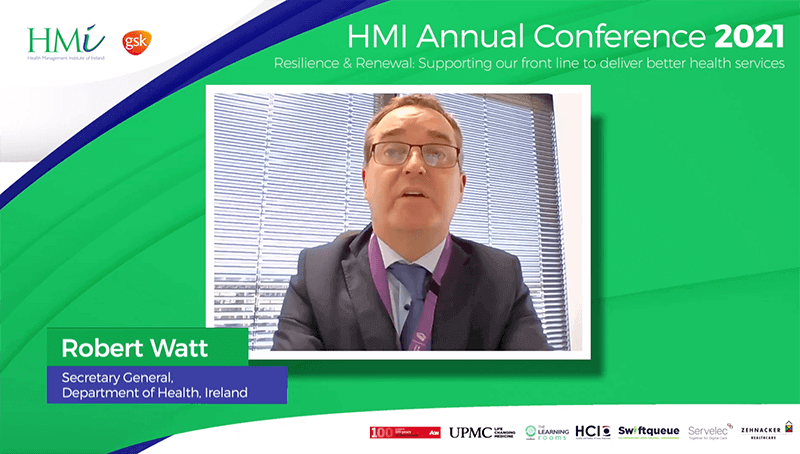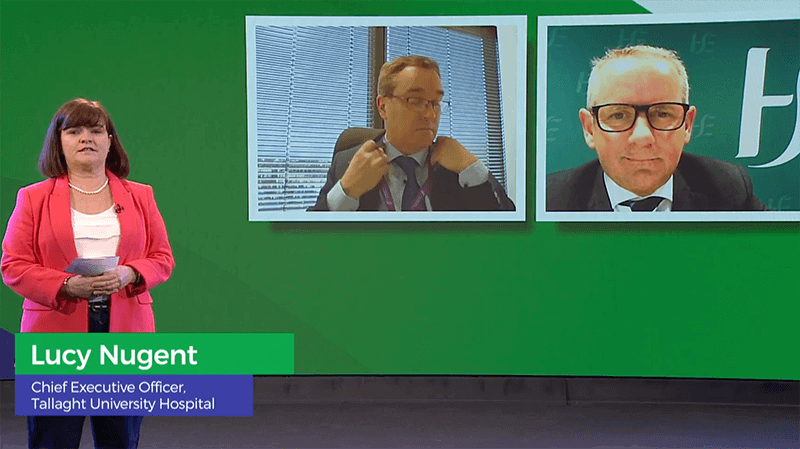Lucy Nugent, HMI Council Member and Chief Executive of Tallaght University Hospital moderated a discussion between Mr Robert Watt, Secretary-General, Department of Health and Mr Paul Reid, HSE CEO.


‘We should move away from the witch-hunt’
Lucy asked Mr Watt
Robert, back in 2011, when you were appointed Secretary-General in the Department of Public Expenditure and Reform, one of the things you said was you wanted a culture focussing on structures, processes, policies. Are we doing it right? Is it the best we can be and with sensible risk-taking, there should be a culture that accepts when you are doing change there will sometimes along the way be mistaken People need to learn from mistakes and we should move away from the witch-hunt Is that something you are applying for your new role?
ROBERT WATT:
I think it is very important to make progress and to improve performance. We need to make a change and sometimes change can be very difficult. It is inevitable if you try things for the first time that mistakes will be made and we need that culture of accepting the mistakes we made and don’t have what I always call a ‘gotcha’ culture, but a learning culture, that we learn both from things that go well and also from mistakes. I think that it really is important because you can’t deliver perfection, but you can deliver very good, 70% or whatever you are doing, very well. So, it really is, to try and have that culture of performance and change, but balanced risk-taking and accepting that things always won’t go well and support our staff when things don’t go well and to have that real culture of innovation. I think that is probably the biggest challenge in the public service, maybe particularly so in the health sphere, because the political media world is very unforgiving and very irrational, so it is about trying to have those really good positive norms of behaviour to encourage leaders to lead, to take sensible risks and to innovate. To echo what Paul said about devolution, we need to set frameworks and an accountability framework and then trust people to go and do the right thing. Like the best people who know how to run our hospital or the best clinicians who know how to provide the best possible care for patients, they are the people who are on the front line, who are close to patients so it is about ensuring that people have the autonomy and we have the correct culture to ensure that people can deliver and take the right decisions and it is about accepting that people won’t get it right all the time
Will we have sufficient staff to run the services?
LUCY NUGENT:
Obviously, we are a people business and obviously there is great investment coming down the tracks but do we have enough doctors, nurses, paramedics, health and social care professionals? Are we training enough people? Also, how are we going to make Ireland an attractive place to come and work and live, because that could actually be one of the greatest stumbling blocks to achieving what we are trying to do, moving forward. Has the Department any thoughts on that.
ROBERT WATT:
Just to add to what Paul said in relation to waiting lists, I think we need to capture and galvanise the great energy and ‘can do’ spirit we have seen over the last 12 months when we address waiting lists challenge Waiting lists for public patients are way too long and are unacceptable. People are suffering unnecessarily, it is the biggest challenge outside of COVID, it is the biggest challenge we face in the health service So the same type of enthusiasm, energy and can-do spirit we have used in the last 12 months we need galvanise that in how we address the waiting list challenge because it is unacceptable. So in the Department of Health, the HSE, across all the different professionals we all need to work to ensure that everything we do is focused on reducing those waiting lists. Paul has mentioned more capacity, utilising the private sector, more ways of working and also challenging ourselves to look at new pathways to care and try to provide the best possible treatments for people as quickly as possible because the current situation is not sustainable and as part of that, recruitment is a very big element. There are very ambitious plans this year for recruitment and Paul and his team are working away at this. I think we need to focus not just on the overall numbers, but where we are recruiting, in what areas and where are the gaps and to really be strategic about it. And also to move away from this narrative that the system is underfunded or that we don’t have enough staff We need to focus on what we have and what we are likely to have and that should be our focus but to really use the resources and the resources that are in prospect as efficiently as possible.
LUCY NUGENT:
In relation to communications, sometimes you could argue social media is running the country and the healthcare system is built on trust and there are a lot of mixed messages going out in Twitter etc. How do you feel we should approach that moving forward because the Government has been accused of mixed messaging?
ROBERT WATT:
I always try not to spend any time at these events talking about the media or talking about politics, because I have views on both which are best to keep to myself. I think we live in an incredibly toxic media-political environment now and it is very difficult I think we need to use social media to put out information, which Paul does very successfully and Minister Donnelly and others are using it to set out a very clear message in terms of what we are doing with the vaccination programme today how the health system is performing today. Our message is about public health. I think we need to use social media to communicate messages, but I really don’t think we should engage in further debate on it. I am not on social media, I don’t intend to be on social media, but I can see it is a valuable tool for communicating information. I wouldn’t engage in any debate on social media nor would I read any of the comments that anyone posts on social media. I think the way Paul uses it is very effective, get your message out there and that’s it. I think social media communications generally are a real challenge for people and I think we need to use the channel to put out the information and from my perspective, that is the beginning and the end.
The toxic nature of the coverage is something I think people need to be very careful about. I know people who work in mental health are very much aware of the effects it is having on some people. Some of the abuse is just absolutely astounding and people need to be very careful. Use it to get out information and that’s it. Don’t engage, don’t follow the comments because it really is very damaging for people’s mental health If they get into that sort of vortex of reading and then commenting on what people are saying. I think it is a very damaging place and particularly for leaders. I know there are many leaders at this Conference who run organisations in the health sector. Resilience and personal resilience are really critical, to stay focused and keep away from a lot of the noise and focus on what you are trying to do I think managing social media properly is increasingly a key part of trying to manage your own resilience.
LUCY NUGENT:
You mentioned resilience Robert and I think at the start of the pandemic there was a great calling to arms, great pride in the health service and of course, now people are starting to get weary. No more than people outside of health, because I think that as a nation and a world we are getting sick of the pandemic. How do you think we can keep that positive image of the healthcare system and pride for healthcare workers in where they work.
ROBERT WATT:
The enormous contribution people have made over the last year is absolutely phenomenal. It is about trying to cherish our achievements and being positive about what we do That’s something we need to focus on, going forward. There is always a tendency because of the way in which media and politics work to focus on the negative, but every day I know Paul and the people in the HSE are providing an enormous service to the citizens of Ireland who are enormously grateful and thankful for the service they receive for them and their loved ones. It is about trying to focus on some of the positives and this is something that people like myself and Paul can focus on. It is really much more effective when you have led within the system, clinical leads, managers in hospitals saying positive things about the system. That is not to say we should turn into Pravda or anything like that. I am not in favour of that. People need to be able to comment and criticise also, that is really important as well. We need to have a proper, balanced debate about the things we do well which are many and also of course to have proper conversations about the things which we need to improve. There are many things I would like to see coming out of the pandemic and one of these is a greater appreciation of the health service and what it achieves and our ambitions for the future and also a better, healthier debate particularly by people who work in the health system that would be really positive.
Robert Watt
Robert Watt is Secretary-General of the Department of Health. He leads the Department of over 600 people and is a key advisor to the Government on managing Ireland’s response to the COVID crisis. This involves advising on public health-related restrictions, the vaccination programme, international travel and the resumption of non-COVID services.
Previously, he spent ten years as Secretary-General in the Department of Public Expenditure and Reform. With the Department of Finance, he managed the budget and estimates process. During this period, he was one of the principal advisers to the Government on economic, budgetary and financial policy issues. He was centrally involved in the management of the Troika Programme.
Robert Watt is an economist and has experience in both the public and private sectors. He has worked in several roles within the Department of Finance as well as previously working as an Economic Consultant and a Lecturer. He has been a member of numerous boards including the board of the NTMA and the Economic Management Council. He is currently a Board member of the Football Association of Ireland.

